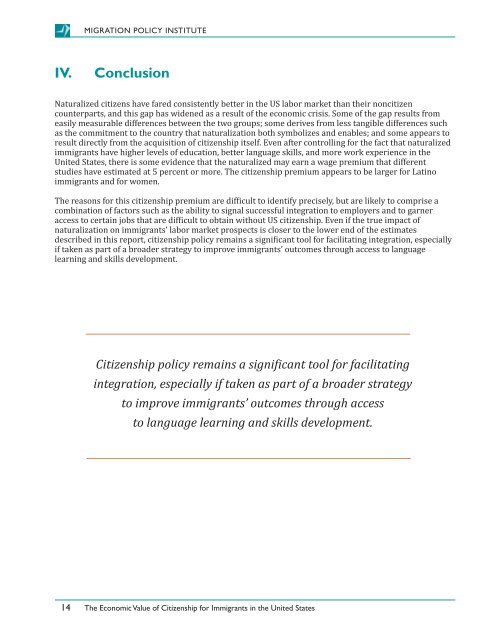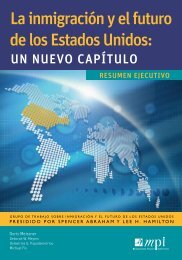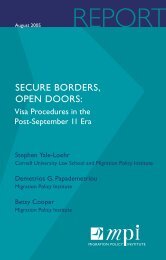The Economic Value of Citizenship for Immigrants in the United States
The Economic Value of Citizenship for Immigrants in the United States
The Economic Value of Citizenship for Immigrants in the United States
Create successful ePaper yourself
Turn your PDF publications into a flip-book with our unique Google optimized e-Paper software.
14<br />
Migration Policy <strong>in</strong>stitute<br />
IV. Conclusion<br />
Naturalized citizens have fared consistently better <strong>in</strong> <strong>the</strong> US labor market than <strong>the</strong>ir noncitizen<br />
counterparts, and this gap has widened as a result <strong>of</strong> <strong>the</strong> economic crisis. Some <strong>of</strong> <strong>the</strong> gap results from<br />
easily measurable differences between <strong>the</strong> two groups; some derives from less tangible differences such<br />
as <strong>the</strong> commitment to <strong>the</strong> country that naturalization both symbolizes and enables; and some appears to<br />
result directly from <strong>the</strong> acquisition <strong>of</strong> citizenship itself. Even after controll<strong>in</strong>g <strong>for</strong> <strong>the</strong> fact that naturalized<br />
immigrants have higher levels <strong>of</strong> education, better language skills, and more work experience <strong>in</strong> <strong>the</strong><br />
<strong>United</strong> <strong>States</strong>, <strong>the</strong>re is some evidence that <strong>the</strong> naturalized may earn a wage premium that different<br />
studies have estimated at 5 percent or more. <strong>The</strong> citizenship premium appears to be larger <strong>for</strong> Lat<strong>in</strong>o<br />
immigrants and <strong>for</strong> women.<br />
<strong>The</strong> reasons <strong>for</strong> this citizenship premium are difficult to identify precisely, but are likely to comprise a<br />
comb<strong>in</strong>ation <strong>of</strong> factors such as <strong>the</strong> ability to signal successful <strong>in</strong>tegration to employers and to garner<br />
access to certa<strong>in</strong> jobs that are difficult to obta<strong>in</strong> without US citizenship. Even if <strong>the</strong> true impact <strong>of</strong><br />
naturalization on immigrants’ labor market prospects is closer to <strong>the</strong> lower end <strong>of</strong> <strong>the</strong> estimates<br />
described <strong>in</strong> this report, citizenship policy rema<strong>in</strong>s a significant tool <strong>for</strong> facilitat<strong>in</strong>g <strong>in</strong>tegration, especially<br />
if taken as part <strong>of</strong> a broader strategy to improve immigrants’ outcomes through access to language<br />
learn<strong>in</strong>g and skills development.<br />
<strong>Citizenship</strong> policy rema<strong>in</strong>s a significant tool <strong>for</strong> facilitat<strong>in</strong>g<br />
<strong>in</strong>tegration, especially if taken as part <strong>of</strong> a broader strategy<br />
to improve immigrants’ outcomes through access<br />
to language learn<strong>in</strong>g and skills development.<br />
<strong>the</strong> economic <strong>Value</strong> <strong>of</strong> citizenship <strong>for</strong> immigrants <strong>in</strong> <strong>the</strong> united states




